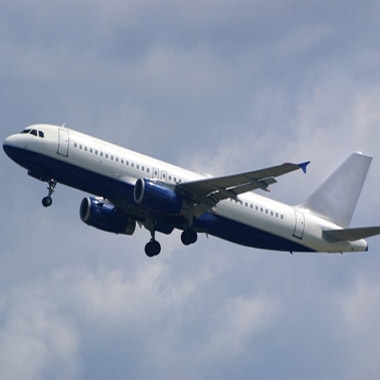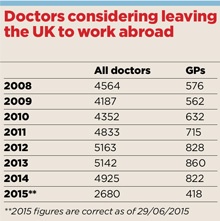800 GPs applying for permit to work abroad every year

Exclusive The number of GPs applying for certificates that enable them to leave the UK to work abroad has increased by almost 50% since 2008, Pulse can reveal.
Official figures from the GMC obtained by Pulse have revealed that the number of GPs who requested ‘Certificates of current professional status’ from the regulator, which allows them to practise oversees, has increased from 576 in 2008 when records began to 822 in 2014.
However, the figures also show that the numbers have stabilised in the past four years, with around 418 having applied in the first six months of 2015. This compares with 828 applications in 2012 and 860 in 2013.
GP leaders said that GPs used to go away for experience, but they are no longer returning.
Pulse revealed yesterday that recruitment agencies were quoting health secretary Jeremy Hunt’s plans for seven-day working in an attempt to attract GPs to work overseas.
Related stories
Recruiters using seven-day working warnings to tempt GPs abroad
Returner scheme attracts 60 new GPs – but only two in areas with worst shortages
5,000 GPs prevented from returning to workforce by ‘red tape’, says the RCGP
The ‘Certificates of Current Professional Standing’ (CCPS) – which was formerly called the ‘Certificate of Good Standing’ (CGS), is the documentation that doctors require the GMC to send to the place where they want to work to prove that no FTP proceedings are ongoing or pending decision.

However, the GMC insists that the CCPS must not be considered a definitive measure of how many doctors have gone to work abroad, adding that the numbers only confirm the amount of doctors which have requested the certificate.
Last year, Pulse reported that 5,000 doctors were looking to leave the UK to work abroad.
But the GMC said that those figures only included certificates which were sent to regulatory bodies abroad on behalf of GPs, while the new figures include the regulatory bodies and also other bodies which the certificates were sent to including health authorites, Government departments or locum agencies.
Speaking to Pulse, Dr Krishna Kasaraneni, chair of the GPC’s education, training and workforce committee, said: ‘There’s two things here. Doctors always went abroad for a period of experience, to gain extra skills and to see things you don’t see in the UK – and they would come back, so from that respect it may not come to as to much of a surprise that the numbers haven’t changed a great deal.
‘But having said that, people aren’t looking to come back. In my own surgery I’ve lost GPs to Australia, and friends who were GPs to New Zealand all in the last few years.’
Guy Hazel, managing director of the Austmedic recruitment agency, told Pulse: ‘We have recently had a big surge in enquiries from GPs that have just finished their training looking to get a job in Australia. Two years ago, I would have said that the enquiries were heavily skewed to GP Partners, and now I think it’s moving more towards young GPs who fancy something different from the UK.
‘There’s still heaps of jobs in Australia – in the outskirts of all the major capital cities – so there is still strong demand. And UK GPs are highly thought of in Australia, and when they arrive, most of them are over the moon with the quality of life. My wife is a GP in Australia and London – over there she controls how many patients she sees, and therefore she can focus on the quality of care she delivers.’
These new figures come as Health Education England recently opted to ramp up its plans boost the GP workforce with its returner scheme which was launched in March.









